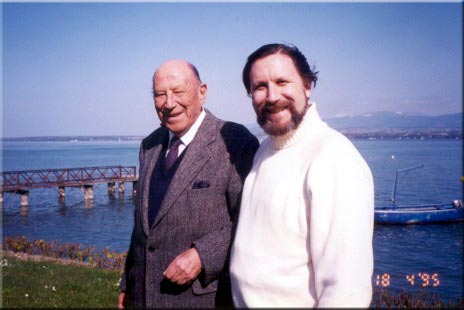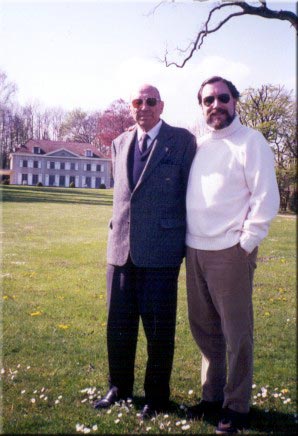|
Katja, my sister Marianne and my brother Philippe join me in thanking you for your good wishes
and for being here to mark the passing of my father Robert Schwob.
My name is Pierre Schwob and I wish to share with you some remarks about my father,
his life and the man.
Before I start however, allow me to apologize for speaking in English, but I haven't
spoken French often during the past 36 years et mon français est plus rouillé
que le Titanic.
My father was "un grand bonhomme" - a formidable man - who lived a full life, a
successful life, mostly a happy life.
He was a man of principles and a man of vision. He was a man of iron will and a man of
unshakable dignity. He was a man of impeccable intuition (more than a man of logic);
always a leader and yet a constant servant to his love for his children. He knew the value
of money and yet could be extraordinarily generous. A man driven by an ever present
sense of duty.
He was a man interested in many things - and equally uninterested in many things.
But his interests, if distilled to a single essence, were centered around one
principal notion: the human character - I mean the moral character of the people
he met or the men and women he worked or played with. To him, genius was far less
important than the moral fiber of the individual he was dealing with.
Robert Schwob was born in a Jewish family in 1914, a few months before the onset of the
First World War, in Porrentruy in the Canton of Bern (now Juras). He often remarked that
had he been born just a few kilometers to the north, he and his family would have
been gassed, exterminated during the Second World War. He was a good and grateful citizen
of Switzerland. He was the only man I knew who said that he, and we, should pay our taxes
with a smile! And he did.
When he was very young his family moved to Geneva where he did all his schooling - at
L'École Brechbuhl and at the Collège Calvin. In his early twenties, he
suffered the loss of his younger sister Suzanne, to whom he was very close, to leukemia.
If the shock was terrible to him, it was devastating to his parents. His father,
Lucien Schwob, lost a great deal of his joie-de-vivre and he died
only a few years later. His mother, Hélène, also never recovered fully and was
always haunted by this tragedy until her own death many years later.
Although his father Lucien had groomed Robert to take over his little stores in Geneva
and Vevey (The Comptoir des Tissus), my father was, at the time, reading the works
of André Gide and Jean Giono, authors who celebrated the earth. Shortly before
the war, my father had been sent to make an apprenticeship at one of the department stores
in New York. (This was partly due to the entreaties of Général Guisan who urged
Jewish families to send their children to the U.S.) But he had other ideas: He pre-wrote
52 postcards which he gave to a friend with the instruction to mail one, each week, from
New York to his parents in Switzerland. Meanwhile he drove cross-country to find himself
a small farm that he could afford.
He ended up buying some desert in the Imperial Valley in California, close to the
Mexican border. And for the next several years he developed it into a very successful
and large ranch.
During that time he met our mother, M'Liz, a WASP from Beverly Hills with whom he had
four children, one of which - Catherine - died soon after birth. Shortly after the end
of the war, his father passed away and, having inherited the two stores, the decision
had to be made whether to stay in the States and sell the stores, or to return to
Switzerland and sell the ranch. As his marriage to M'Liz wasn't happy and, probably more
importantly for him, given that he believed that his children would get a better
education in Geneva than in the middle of the Imperial Valley, he opted to return
to Switzerland. He sold the ranch and then began to develop the business inherited from
his father.
He often said that one of the secret of his successes had been the ability to select the right
collaborators and to be able to delegate. He certainly knew how to surround himself
with trustworthy and capable cadres but I believe that his success was also largely
due to his unerring business instinct and, indeed, the loyalty he elicited from
his collaborators.
During that time he also enjoyed an active social life, competed in horse shows and
sailing regattas. It is worth to note that, although my father was always conscious
and proud of his Jewish heritage and identity, he also felt rather completely
integrated in the various social milieux he immersed himself in. "Il était
toujours bien dans sa peau." It didn't hurt either that my father enjoyed
a considerable amount of charm.
He built his dream house, La Ferté, on the lake with a view towards the
Mont Blanc.
In 1957, he married Mercia Tinker, one of the great beauties of the time and a woman
endowed as well with a sharp intellect. Mercia was surely instrumental in expanding my father's already
considerable horizons. One of the couple's signal achievements was their devotion to,
and successful support for, the Hebrew University of Jerusalem.
By 1974, the Comptoir des Tissus had morphed into the Comptoir des Tissus et Confection
and finally into Contis - a chain of eleven stores throughout Switzerland. Then my father
received an offer to sell the enterprise to a global chain of stores owned by the
Brenninkmeijers of Holland. This he did and in short order he divorced and retired.
His present to himself for a job well done was to hire a 65 foot sailboat and a crew to
sail around the world. He asked his friend Katja to join him, indicating that should they
still love each other after all these years at sea - they should marry. They did and they did.
And lived happily ever after.
I take this opportunity to give my, and my siblings', heartfelt thanks to Katja for her
extraordinary devotion to our father, particularly during these past 10 years during
which her husband's health started to decline. They loved each other and it was
invariably heartwarming to see them together.
Thank you.
Pierre R. Schwob
Geneva, 20 May 2003
|

